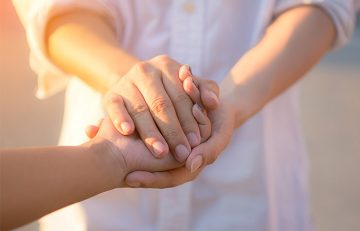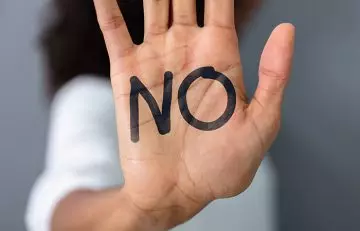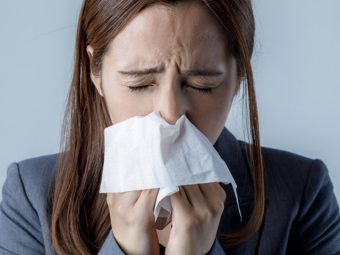9 Unconventional Acts Of Self Care That Are Actually Very Important

Image: Shutterstock
Self care is one of the topics that has become quite popular lately. Everybody is speaking about self-care, and rightfully so. The Covid-era with its never-ending lockdowns and travel restrictions has almost forced us to be cooped up inside our homes . Self-care has been one of the ways for us to maintain our sanity during these troubling times somewhat (1). But what you might not know is that self-care isn’t just about bubble baths, a new haircut, and eating healthy food and physical appearances; it is so much more! There is a vast spectrum of self-care needs that range from the most simple ones like eating healthy food, practicing mindful movement, and skipping the latest fitness trend to follow a workout that suits you better. And plenty of times, the world around you would like to tell you that your ideas of self-care and self-preservation are selfish or not right. So here is a list of ten everyday actions that are self-care but might not seem like they are:
1. Not Taking Work Calls Outside Working Hours
One of the most important ways to practice self-care is by logging out from work and establishing boundaries with your bosses and colleagues. Even if you are working remotely during this time, you should put a specific time constraint.
2. Accepting Help From Others
You read that right. In today’s fast-paced and digital world, every single person is striving to be self-sufficient, to the point where asking for help is looked down as a sign of weakness. This should not be the case at all. Try your best, but if something is not right and others are ready to help, give it a chance. It’s so much better than beating yourself up and suffering alone.
3. Cutting Off Toxic People
From family to colleagues and friends, there will be plenty of people who end up being toxic and terrible to you. It’s totally okay for you to cut yourself off from them and instead surround yourself with people with whom you enjoy spending time. In the end, your mental health is more important than keeping up appearances and acting nice. There should be no negative connotation attached to blocking certain people on social media too for the sake of protecting your mental health. That counts as self-care too. It is just another way of saying that you can’t handle this person.
4. Setting Healthy Boundaries With Loved Ones
It is lovely for you to say no to people in your life. If someone is pushing you to do something that you are uncomfortable doing, it’s okay to tell them no. Setting healthy boundaries with your family, co-workers, and friends may help protect your overall health and well-being more than anything.
5. Not Attending Gatherings If You’re Feeling Socially Drained
There is no need to force yourself to attend a social gathering if you are not in the mood for it. You shouldn’t be made to feel guilty if you are in no mood to attend a social group. Instead of that, you should devote more time to yourself, focusing on your self improvement.
6. Getting Proper Rest Even While Working From Home
Something that may seem obvious but is really important is managing to nail your sleep hygiene and simple self-care ideas. There will be days where you might be exhausted from work and aren’t in the mood to do any household chores. It’s okay just to go and sleep instead and clean up the next day. You must make sure that you get a good night’s sleep as it is one of the best things you can do to improve your mental health. More so, getting adequate rest at night will cost you nothing and give you a sound peace of mind (2).
7. Picking Up A New Skill
There are plenty of things you can learn to do in your spare time that can actually be self-care! One of the best ways to practice self-care is by upskilling. With the extra time in your day, you can learn a new language, do gardening, and do so many other tasks. This will allow you to take some time out of your day to focus on improving your skill set. Even if it is just for ten minutes, it will be worth it.
8. Trying Out A New Recipe
Cooking does not have to be something that is a rushed experience. While our mind tends to go on autopilot mode when we cook, it’s essential to be mindful of what we’re creating. From measuring out cups of milk and water to creating dishes with leftover ingredients to exchanging recipes with friends, cooking, baking, and so much more! The time you spend in the kitchen can be used as time to wind down, learn a new recipe, and calm your mind down. Cooking and baking can be super grounding and therapeutic as they involve and engage all your senses. The repeated motions, such as chopping, mixing, weighing, can anchor you to the ground and allow stressful thoughts to leave your mind.
9. Saying No
This might be more challenging for natural people-pleasers but quite important nonetheless. Saying no does not mean that you are hurting the other person, it simply means you are not in the mental space to fulfill a favor or query (3). There is nothing wrong in prioritizing yourself over others sometimes. It doesn’t make you a bad person. In fact, it further amps up your self-confidence. Never feel obligated to say yes if it does not seem right to you. Have an open conversation instead and state your opinions politely.
It’s crucial to note that self-care works differently for different people. If someone likes to cry it out, others use modes of distraction to suppress negative thoughts. At the end of the day, these small acts can be a significant step to keep your mind at ease and pave the way towards step-by-step healing. Remember, you take the reins of your mental and emotional availability for all the relationships in your life. Do what you need to do to make yourself feel calm, happy, and connected with the people you love. Which of these self-care practices will you be following in your daily life?
References
Articles on StyleCraze are backed by verified information from peer-reviewed and academic research papers, reputed organizations, research institutions, and medical associations to ensure accuracy and relevance. Read our editorial policy to learn more.
- From anxious loneliness to meditation: a mental health self-care strategy to cope with the COVID-19 pandemic
https://www.ncbi.nlm.nih.gov/pmc/articles/PMC8344784/ - The importance of sleep
https://www.proquest.com/openview/799eb1dfdb388d6ed01f8c02abd7af6d/1?pq-origsite=gscholar&cbl=30130 - The Other Meaning of “ADR”
https://www.proquest.com/openview/82b851a01b3518e8b3d4fab1cfac3abe/1?pq-origsite=gscholar&cbl=25210





















